Crawling Back: Amazing Spider-Man #3 Review (The Sinister Six, Part 2)
Doc Ock's introduction is built on interesting character concepts which don't quite play out as powerfully as they could
—by Nathan on December 8, 2023—
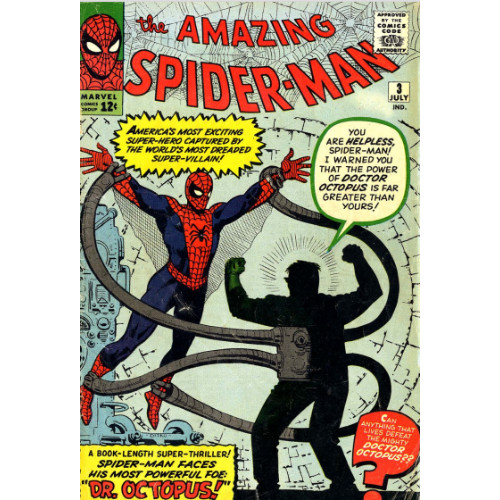
An issue after defeating the winged weirdo known as the Vulture, Spidey would encounter, as the cover to Amazing Spider-Man #3 so self-indulgently announces, "the world's most dreaded super-villain"...or, in Spidey’s own words, "the most dangerous villain I’ve ever faced!" He's not wrong, per se. When your only competition is an armed burglar, a Soviet spy, and an old man in a flight suit, the mad doctor with the metal tentacles is a terrific terror to tackle. Still, the cover hypes the deadly Doctor Octopus to the nth degree: if labeling him "the world's most dreaded super-villain" doesn't convince you of his maniacal madness, maybe calling him Spidey's "most powerful foe" or asking if "anything that lives" can "defeat the mighty Doctor Octopus" will show you this dude is no Santa Claus.
Yeah, it's a little much, especially for the villain's first appearance. But those 60s comics just thrive on borderline false advertising, y'know?
These days we know Doctor Octopus as the Master Planner, the mastermind behind the Sinister Six, the cad who caused the death of George Stacy. Heck, he was even the Superior Spider-Man for a time! Otto Octavius, driven mad by the chemical explosion which fused his arms to his body, has carved himself quite the legacy, often across Spidey’s own skin.
I’m assuming Stan Lee and Steve Ditko could barely imagine the heights their sadistic supervillain would scale when they first created him…though given his additional appendages, Doc Ock (as he's warmly known as) is quite the climber. We look today at his first appearance, a glimpse into where the famed felon comes from as he plants the seeds for his long-standing enmity against our Web-Head Wonder.
"Spider-Man Versus Doctor Octopus"
Writer: Stan Lee
Penciler: Steve Ditko
Inker: Steve Ditko
Colorist: Stan Goldberg
Letterer: John Duffy
Issue: Amazing Spider-Man #3
Issue Publication Date: July 1963
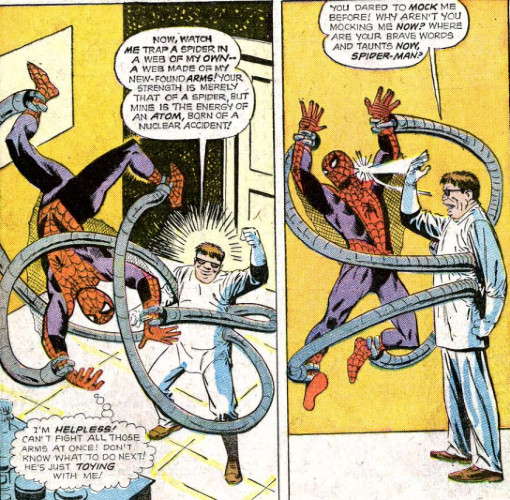
Over the decades, a deep-seated bitterness has developed between the Octopus and the Spider. In many ways, Octavius presents a foil for Peter Parker: he's a scientist, gifted with intelligence, who squanders his brilliance on increasingly maniacal plans (remember that time he tried blackmailing drug addicts with the cure to cocaine addiction?). Perhaps more than the Green Goblin even, Doc Ock represents the image of who Peter may become were he not so earnestly convinced of his "With great power.." mantra. There's a reason Dan Slott's Superior Spider-Man was, by and large, a morality play, crafting a redemptive arc for a villain who, until then, had wasted his life scheming his revenge against Spider-Man.
Very little of that complicated figure exists here–those developments would unfurl across the decades. Still, it's telling that Lee and Ditko give us a scientist as the alleged "world’s most dreaded super-villain." Little is made of the scientific connection between Peter and Octavius–nowhere does Spidey comment that they're both products of scientific experiments gone awry (a point John Byrne doubled down on decades later when he made Spider-Man and Doc Ock byproducts of the same experimental accident), nor does he reflect on Octavius' genius or their mutual love of science (even though he uses his brainpower and scientific know-how in battle against the multi-limbed lunatic). Some may point to this as a missed opportunity; I am actually grateful. Knowing Lee's love of belaboring his audience with exposition, allowing a reader such as myself to interpret the connections makes for a more enjoyable read. It's difficult to ascertain whether that was Lee's intention when scripting this issue, but I appreciate the chance to interpret details nevertheless.
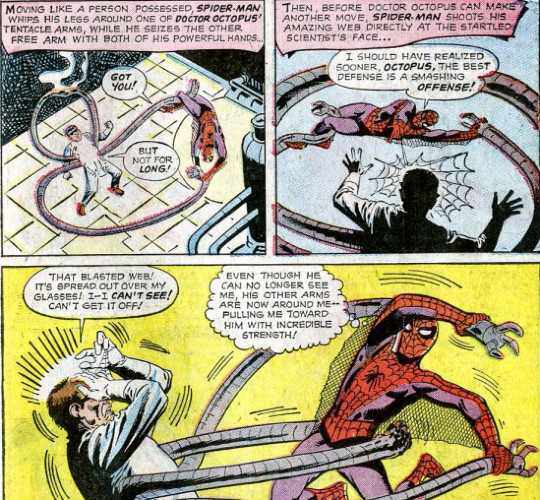
Somewhat surprisingly, both characters are connected in an internal way as the issue develops: they're both arrogant. As the issue opens, Spidey defeats a group of thieves rolling away from a warehouse with a safe; after polishing those punks off, he declares he's run out of enemies who can give him a fair fight and wishes for a foe who'd be challenging. Again, given his track record so far, it's not a wholly unwelcome wish, but Lee really hones in on this point, specifically building towards the idea that, in this issue, ole Spidey will meet his match. Spidey speaks in these wild absolutes, so what else are you going to do but promise your readers the strongest adversary possible to match if not exceed Spidey's strength?
The only problem is that this arrogance is another inference on my part, and while we can posit that Lee shapes Peter as this "I’m an invincible teenager" kinda guy in this issue, it really seems like the only reason Peter wishes for a stronger enemy is to hype up Doc Ock, not showcase a facet of Peter's youthfulness. When he's defeated, Peter (figuratively) swings over to the opposite end of the emotional spectrum–instead of being boastful, he questions his worth entirely. Is this the end of Spider-Man? he asks himself. He mopes in his room, considering himself a joke, a failure, even telling J. Jonah Jameson he probably won't get photos of Spider-Man ever again. The point is blindingly clear: a Spider-Man who views himself at the height of his power is humbled–nay, humiliated!–and cast into the dregs of defeat, where he must wallow in self-pity before shaking himself out of his stupor…or is shaken out of it.
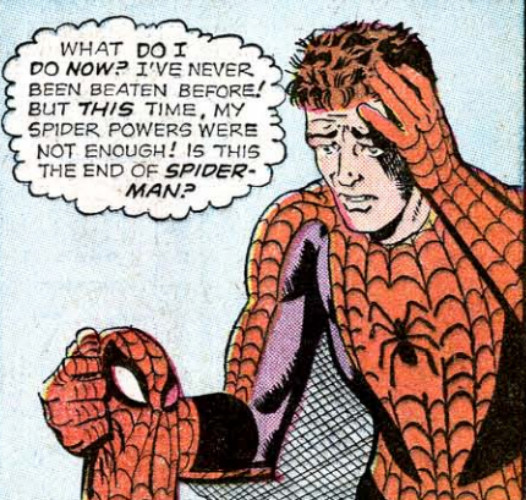
We're talking a 21-page, self-contained comic book issue here, so I suppose it's too much for me to say the whole bit feels forced and rushed. A strong supervillain just so happens to pop up at the exact same time Spidey's getting a bit too big for his red-and-blue britches? What are the odds? Were this a two- or three-part narrative, the theming would be more palatable or at least strung along across longer scenes allowing for us to easily absorb Peter's arrogance, his later frustrations, and his rise from the depths of disaster. When he does eventually come out of his emotional slump, Peter doesn't even acknowledge his initial arrogance; he just needed the proper motivation, is all, not a change to how he perceives himself as a hero. As a guy whose arrogance got his uncle killed however many months, if not mere weeks, before this Doc Ock debacle, Spidey should check his ego at the door.
The plot does allow for Lee to play with a little worldbuilding, as it's Johnny Storm, the walking teenage matchstick and future Spidey-buddy, who inadvertently shakes Peter out of his aforementioned stupor. The Human Torch visits Peter's school, encouraging students to "Never give up!" and "Never say die!" and "Don’t be discouraged!" (oh, and "Don’t listen to your future brother-in-law when he asks you to help him steal an experimental rocket!"). Normally, I'd assume Aunt May to be Peter's shoulder angel, give him some of her patented maternal advice or cheer him up with a wheat cake. It's refreshing to have Lee make a superhero the same age as Peter the voice of reason, even if Johnny's dialogue is corny and cliche. And I know "refreshing" may sound weird when you're talking about only the third issue of a series that recently celebrated sixty-years (and counting!) of publication, but I speak from the perspective of an experienced reader who's lost count of how many times May's given Peter a bit of affectionate wisdom over the decades.
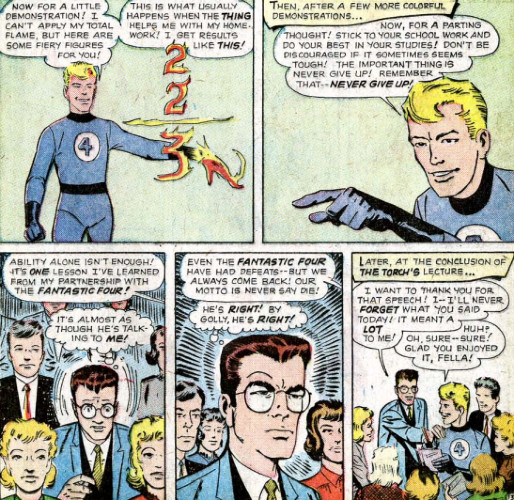
As the villain of the piece, Otto Octavius (whose real name, fun fact, is never mentioned in this issue) is expected to be arrogant, which seems to be an effect of the accident which bonds his arms to him. We know Ock is brilliant before the accident, but he makes little comment on his intelligence–if anything, the only hint is that Octavius notes his arms allow him to "make [radiation] my servant," but this may be less a hint at his ego and more a statement of fact. It's sometimes hard to tell with Lee. No, Octavius' ego comes to the fore after the explosion, with the doctor realizing he can combine his intellect and his control over his arms to become "the supreme human being on Earth!" (the one epithet the cover forgot to add) All of this pontificating, punctuated by Ock gesticulating with his newly-bound appendages, helps cement Octavius as that foremost foe the cover touts him as being. When he soundly whoops Spidey in their first confrontation, Ock proves his fortitude against the Wall-Crawler.
Unfortunately, though his prowess matches his boasting, Octavius never makes his intentions clear. We never learn why he takes hospital staff hostage or why he later takes control of an atomic research center. He mentions, at one point, folks are trying to keep him away from his experiments, so we can assume he just returns to his previous place of employment to keep experimenting. I guess we can also conclude it's the paranoia caused by his "permanently damaged" brain which makes him sneak into his old lab and take it by force. There's talk of nuclear energy and radiation, but what exactly Octavius was handling before the explosion, and how precisely he hopes to show the world his newfound power as Doctor Octopus, is left unknown. He's strong, he's smart, but he's a little too reliant on his intelligence. For all the scenes where a supervillain rams his plotting down our throats, Ock is the opposite, and it's a plot point where inference doesn't do me much good. It's as if Lee expects us to fear Doc Ock because he's the first villain to defeat Spider-Man; aside from this, however, we have little reason to be concerned.
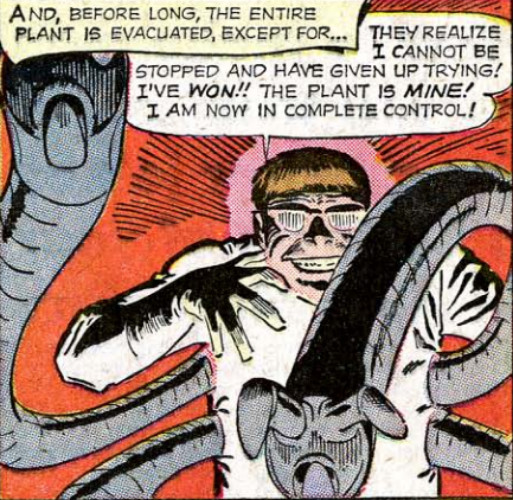
I've noted, in past posts, Lee's heavy reliance on awkward romantic subplotting in his early Spidey issues, but fortunately, we skip past any of that here. Supporting cast members barely squeeze into any panels, save for a few glimpses of Aunt May, JJJ, and Flash. Betty Brant wouldn’t be introduced until the next issue, and a blond-haired girl who maaaay be Liz Allen tells Peter of the Torch's assembly then quickly vanishes. Point being: this is a Peter Parker issue, and really the only relational aspect is the enmity established between him and the devious doctor. It certainly streamlines the issue, focuses the story Lee wishes to tell, even if he fumbles some of those elements like a regular scientist trying to catch a falling beaker. Invest in those metal arms, man.
Otto "Doctor 'Doc Ock' Octopus" Octavius (as his friends call him) has become quite the conniving character over the decades, and even if his first appearance feels like a pale shadow of the more modern madman of a mollusk he'd become, his origin is worth noting and keeping in mind. Lee strains our credulity by existing at the extremes–this issue has it all: the greatest villain! The greatest defeat! The greatest crisis of confidence Spider-Man would ever encounter! There's no denying the cultural footprint of Amazing Spider-Man #3, but there's also no denying it's a tad boastful for its own good, kinda like its central characters. Much better (and worse) things would lie in store for our Wall-Crawling hero–greater villains, greater defeats, greater crises of confidence…and, from the ashes, greater efforts to pull himself to the surface in a continual effort to remind us of Spidey's unflappable demeanor. Yeah, you can put him on the ground (or even in the ground), but in the words of his best frenemy, Johnny Storm, he’ll “Never give up!”
At least, not permanently.